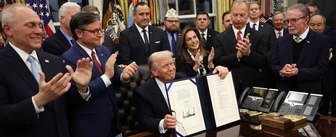Last week, the FBI arrested Jack Teixeira, a member of the Massachusetts Air National Guard, for leaking classified military documents.
Most Americans in the latest Economist/YouGov poll say they have heard a lot (27%) or a little (48%) about the leak of classified military documents that contained classified information about — among other things — the war in Ukraine, China, and U.S. intelligence gathering tactics. Democrats (79%) and Republicans (76%) are similarly likely to say they heard at least a little about the leak, as are people who consume news from MSNBC (83%), Fox News (82%), or CNN (75%).
The unauthorized release of documents has caused concern among Americans, with 68% saying that they are very or somewhat concerned that U.S. national security was compromised by the leak. Just one in five (21%) do not think the publication of secret documents is cause for concern, and 11% are unsure. The worry crosses party lines: 76% of Democrats and 69% of Republicans say they are concerned.
The U.S. government has not revealed what Teixeira's motive was for leaking the documents without authorization, but most Americans (57%) say he should be thought of more as a criminal, rather than a hero; 16% say he is more of a hero, rather than a criminal. About one-quarter (27%) are uncertain. Democrats (68%) are more likely than Independents (52%) and Republicans (51%) to view the person who leaked the documents more as a criminal than as a hero.
In the leaked documents, information was revealed that indicates the United States has been spying on Russia, Ukraine, and South Korea. Most U.S. adult citizens strongly or somewhat approve of spying on Russia (69%) and Ukraine (54%), with Republicans being especially likely to support spying. Americans also are more likely to approve (45%) than disapprove (34%) of spying on South Korea.
See the toplines and crosstabs from the Economist/YouGov poll conducted on April 15 - 18, 2023 among 1,500 U.S. adult citizens.
Methodology: Respondents were selected from YouGov’s opt-in panel using sample matching. A random sample (stratified by gender, age, race, education, geographic region, and voter registration) was selected from the 2019 American Community Survey. The sample was weighted according to gender, age, race, education, 2020 election turnout and presidential vote, baseline party identification, and current voter registration status. Demographic weighting targets come from the 2019 American Community Survey. Baseline party identification is the respondent’s most recent answer given prior to June 1, 2022, and is weighted to the estimated distribution at that time (34% Democratic, 31% Republican). The margin of error for the overall sample is approximately 3%.
None














